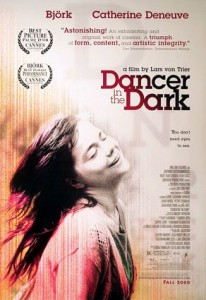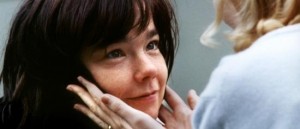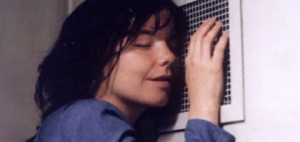Denmark’s enfant terrible Lars von Trier won the top prize of the 2000 Cannes Film Fest for Dancer in the Dark, a postmodernist, deconstructive movie musical, starring the singer Björk, who deservedly won the acting kudos.
Grade: A- (****1/2* out of *****)
This is the third film in von Trier’s “Golden Heart Trilogy”; the other two films are Breaking the Waves (1996) and The Idiots (1998), both of which had also premiered at the Cannes Film Fest.
The film’s title suggests the Fred Astaire-Cyd Charisse duet “Dancing in the Dark” from Minnelli’s 1953 masterpiece, The Band Wagon, which ties in with the feature’s musical theatre theme.
Original, disturbing, and rather grim, the musical melodrama, which is set in in the early 1960s, features Bjork as Selma Jezkova, a Czech immigrant who works in the local metal factory, while raising by herself her young son (Vladica Kostic).
Living a dreary life, Selma lives in a shabby caravan she rents from the town’s policeman Bill (David Morse). A lover of musicals, Selma bursts into song-and-dance as a form of escapism from her dreary life.
The film has polarized critics, with some describing it as a sentimental female melodrama, while others perceiving it as a significant contribution to the musical genre.
Fans of Von Trier admire the movie for its daring audacity, but his detractors are quick to point out elements of misogyny as well as strong thematic resemblance to “Breaking the Waves,” which also featured a doomed, child-like heroine (played by Emily Watson).
However, all critics seem to agree that Björk renders an astonishingly raw performance, not to mention her great emotional singing, which is in completely congruent with the dark, drab and grim tone of the surrounding musical
Trier and others have described her performance as reflecting a state of “emotional feeling rather than dramatic acting per se.
Actress Björk, known primarily as a contemporary musician, had rarely acted before. She described the process of making this film as so emotionally taxing that she would not act in any film ever again.
That vow was later changed, when she appeared in Matthew Barney’s film installation Drawing Restraint 9 in 2005, and in Robert Eggers The Northman.
The film’s soundtrack, released as the album Selmasongs, was written mainly by Björk. Björk lies down on a stack of birch logs during the “Scatterheart” sequence.
Other songs featured contributions from Mark Bell and the lyrics were by von Trier and Sjon.
Three songs from Rodgers and Hammerstein’s prize-winning musical, “The Sound of Music,” were also included in the film.
The musical sequences were filmed simultaneously with over 100 digital cameras so that multiple angles of the performance could be captured and later cut together in different ways in the editing room.
The film displays some of the aesthetic agenda of the Dogme 95 manifesto. Dancer in the Dark was shot on low-end, hand-held digital cameras to create a documentary-style appearance.
However, it is not a true or pure Dogme 95 film, however, because the Dogme rules stipulate that violence, non-diegetic music, and period pieces are not permitted. Trier differentiates the musical sequences from the rest of the film by using static cameras and by brightening the colors.
Von Trier’s most commercial film, Dancer in the Dark was made on a budget of $12.5 million, earning $45.6 million at the global box-office.
Cast
Björk as Selma Ježková
Catherine Deneuve as Kathy (Cvalda)
David Morse as Bill Houston
Peter Stormare as Jeff
Joel Grey as Oldřich Nový
Cara Seymour as Linda Houston
Vladica Kostic as Gene Ježek
Jean-Marc Barr as Norman
Vincent Paterson as Samuel
Siobhan Fallon as Brenda
Željko Ivanek as District attorney
Udo Kier as Dr. Pokorný
Jens Albinus as Morty
Reathel Bean as Judge
Michael Flessas as Angry man
Mette Berggreen as Receptionist
Lars Michael Dinesen as Defense attorney
Katrine Falkenberg as Suzan
Stellan Skarsgård as the doctor
| Dancer in the Dark | |
|---|---|

Theatrical release poster
|
|
Credits:
Directed, written by Lars von Trier
Produced by Vibeke Windeløv
Cinematography Robby Müller
Edited by François Gédigier, Molly Marlene Stensgård
Music by Björk (and others)
Production companies: Zentropa Entertainments, Canal+, FilmFour, France 3 Cinéma
Distributed by Fine Line Features (US)
Release dates: May 17, 2000 (Cannes); September 1, 2000 (Denmark)
Running time: 140 minutes
Language English
Budget: $12.5 million
Box office $45.6 million

Oscar Context:
The song “I’ve Seen It All”, with Thom Yorke, was nominated for the Best Song Oscar, but it lost to Bob Dylan’s “Things Have Changed” from Curtis Hanson’s Wonder Boys.














